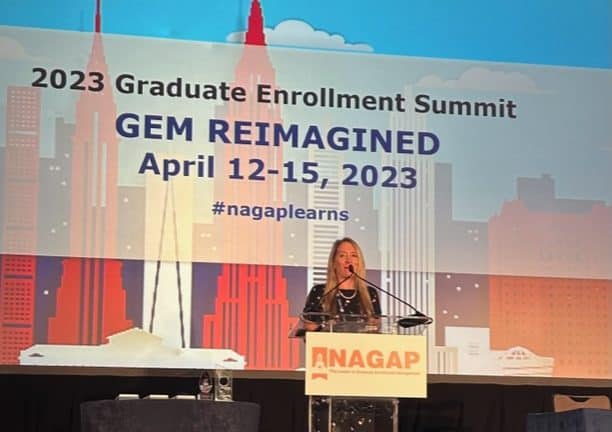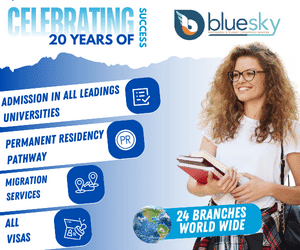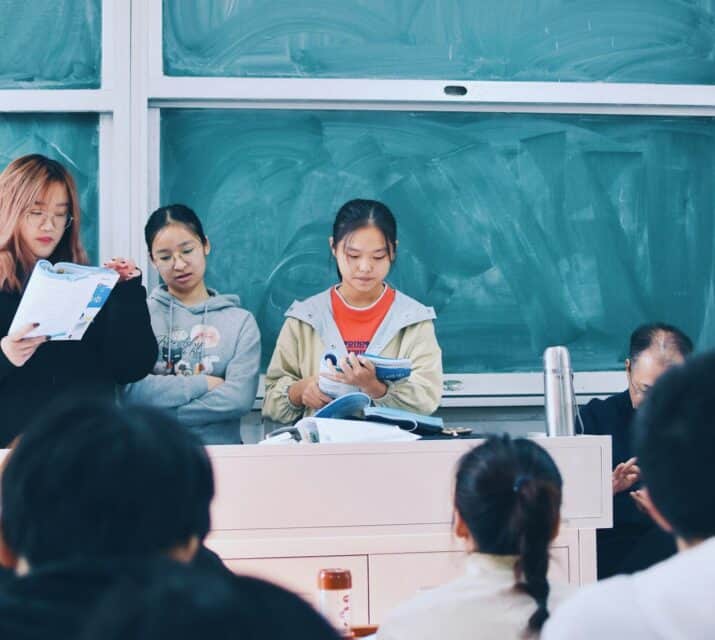The sector is at a “critical point” as it emerges from the pandemic, one stakeholder claimed at the NAGAP Graduate Enrolment Management Summit.
Revamping supports for students and emphasising self-care for graduate program professionals were two prevalent themes at the conference, held in New York City from April 12-15.
“We’re at a critical point for our industry.
“Schools are looking for graduate programs to offset some of the projected undergraduate enrolment declines, particularly in the US, while we’ve had some of our colleagues exit the industry following the pandemic,” Marcus Hanscom, director of graduate admissions at Roger Williams University told The PIE News.
Indeed, as the sector emerged post-pandemic, it was clear to many graduate admissions staff that the way in which they served students required significant changes.
As such, presenters discussed how to meet enrolment and retention goals and to address the lack of visibility many graduate students experience on campus.
Lehigh University’s Angelo Lambroschino and Cassandra Cabral-Castro of Moravian University discussed financial aid, scholarships, research grants, writing assistance, mental health providers, and alumni networks as supports available to many graduate students that often go underutilised.
Interstride recently conducted a survey of international graduate students and professionals about the most significant challenges and supports in the enrolment process.
Julie Deland of Harvard University noted that the top two challenges for international students are finances and visas, according to survey results.
“Admission and aid timelines don’t always align,” Deland said. “Yet, to obtain a visa, students must show full funding.”
Interstride’s Judy Chen added such interrelations with these issues as “challenging”.
Chen shared that university websites and email communications, along with support from graduate admissions professionals, were rated the most helpful resources by international graduate students.
NAGAP board member Katie-Ann Mason, who is the associate director of graduate admissions at Bridgewater State University, told The PIE that she gained “additional ideas to improve the application process for international applicants”.
“We’re at a critical point for our industry”
“Every year the NAGAP GEM Summit allows attendees from the same field to put their finger on the pulse of rising trends, concerns, and solutions,” Mason said.
Likewise, Ling Zhang, director of graduate and international recruitment at Central Michigan University shared with The PIE that “the informative sessions provided valuable insights into the trends and challenges facing graduate enrolment”.
In addition to sharing supports for graduate students, conference themes highlighted the importance of self-care for professionals in the field.
The opening keynote address by Freedom Writers actress April Hernandez Castillo focused on putting oneself first in order to thrive and to be able to help others do the same.
Referencing the pandemic, Hernandez Castillo advocated for finding “joy in the chaos” in order to inspire graduate students.
She noted that convening at conferences like NAGAP can help professionals rekindle the joy of being in education, despite the new set of challenges brought on by the pandemic that still remain part of the graduate admissions world.
Hanscom agreed: “NAGAP and the GEM Summit really play a critical role in supporting graduate enrolment professionals as they navigate the challenging times ahead.”
“Admission and aid timelines don’t always align”
“I’d argue that a connection with NAGAP has never been more important for professionals working in our field,” Hanscom added.
The closing keynote address also concerned fostering connectedness. In discussing how to increase personal and professional happiness, Paul Krismer, the founder of the Happiness Experts, identified the degrees of burnout and how to combat them.
Krismer said burnout often begins with emotional exhaustion, which is followed by a lack of efficacy, and then depersonalisation. He stated that noticing and acknowledging signs of burnout are the first steps in addressing it.
Developing resources, such as having work friends and setting boundaries, have been proven to decrease burnout and increase employee satisfaction and retention, Krismer added.
Krismer suggested to the admissions professionals that automating happiness is possible.
“If we do more and more of the same thing, our brains get better and better at doing it. If we can lay down enough neural pathways so that happiness comes more readily to us, then we will simply be more happy automatically,” he added.











